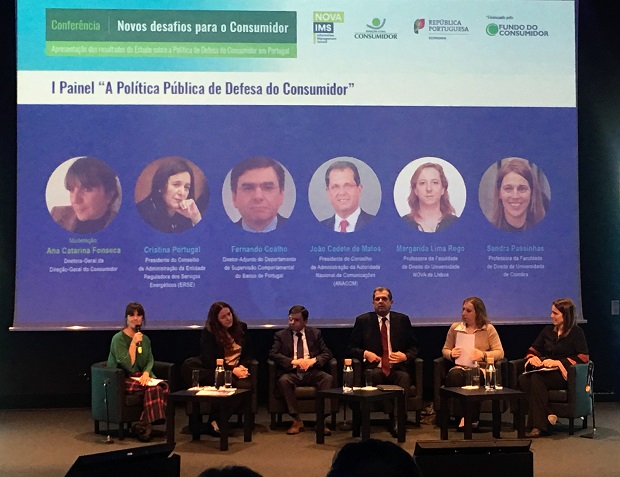ANACOM's Chairman, João Cadete de Matos, has taken part in the panel “Public Policy on Consumer Protection” of the presentation of the Study on Consumer Protection Policy in Portugal, during the conference on “New challenges for the Consumer”, which was held on 15 March 2019, in Lisbon, organised by Direção Geral do Consumidor (Directorate General for Consumer).
On the panel, the Chairman of ANACOM highlighted some of the most recent decisions taken by this Authority in defence of consumer rights and interests, in particular the approval of the minimum level of detail and information to be included in the bills that electronic communications operators should provide free of charge to subscribers that request detailed billing, regardless of the format and means used. The information that is now provided includes the date on which the binding period ends and the expenses payable by the customer if this person wishes to terminate the contract on the invoice issue date.
Other examples of work developed by ANACOM in benefit of the consumer include: the Consumer Portal, which provides a huge amount of information aimed at the consumer, clear, simple and accessible language and can help to clarify doubts; tools such as NET.mede, through which consumers can check their Internet access speed; and COM.escolha, an interactive tool that enables consulting the pricing of the providers and making simulations to see which pricing is best suited to the users' needs.
The Chairman of ANACOM also made note of the recent proposed amendment to the Electronic Communications Law, submitted to the Parliament and Government which, among other measures, proposes an alteration to the customer binding rules, so as to make the early termination of contracts less onerous for consumers, when there are binding periods. Another proposal directed at consumers involves the subscription of contents and services on the Internet (WAP billing), establishing that electronic communications service providers should only require their subscribers to pay for digital contents or services that are not electronic communications, when they have been previously and explicitly authorised.
ANACOM's effort in promoting improved quality of information provided to users of communications services, essential for them to know their rights and enable them to make better choices, was yet another topic stressed on a day on which ANACOM launched a video to explain how to make complaints in the physical and electronic complaint bookhttps://www.youtube.com/embed/ntVJXfI9ciA?rel=0&autoplay=1.
The recent decisions on the universal postal service were also mentioned, namely the definition of a table of stricter service quality indicators, the determination of rules enable a more reliable measurement of these indicators, the draft decision on the density of the postal network, which recommends that each municipality should have at least one post office or postal agency with features equivalent to those of a post office, and defines the requirements that the post office should observe.
The panel also included Cristina Portugal, Chair of the Energy Services Regulatory Authority (ERSE); Fernando Coalho, of the Supervision Department of Banco de Portugal; Margarida Lima Rego, Professor of NOVA Law School of Universidade Nova de Lisboa; and Sandra Passinhas, Professor of the Faculty of Law of Universidade de Coimbra. The panel was moderated by the Director-General of the Directorate General for the Consumer, Ana Catarina Fonseca.





